Zane's Top 10 Book List
The Different Book Lists
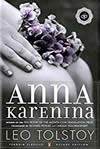 1. Anna Karenina by Leo Tolstoy (December 2008 - January 2009) [Book #80/305]
1. Anna Karenina by Leo Tolstoy (December 2008 - January 2009) [Book #80/305]
The only one on all 5 lists (Norwegian, Observer, BBC, and Sybervision) - Being the only book on all 5 of my Greatest Books lists, I had high hopes for it. And to start off, I thought this was one of the most well written stories I have ever read. Tolstoy just flows with descriptions that make you feel you understand everything that is going on. The characters are extremely well developed and even though they are Russian (which has a tendency to jump around with names a bit) it is still easy to follow who is who. I enjoyed several of the references to early communist culture (the book takes place about 30 years before the communist revolution) and several of the characters' personality polarities and themes that are emphasized in the book (religious vs non-religious, upper vs lower class, etc.). However, I did have some problems with the book. The story felt like two separate stories going on at the same time. The "main" one should be the one with Anna but I got the feeling that for the most part the main story was the one that centered around Levin, who supposedly represented Tolstoy himself. The Anna story itself felt enjoyable and well written, focusing around her leaving her husband for another man, of which that relationship slowly dissolves over the length of the book as well. While the story with Levin, although in parts were very good, I felt was very political and sometimes unimportant to anything. The whole last section (after the Anna story line was wrapped up) felt forced and out of place, leaving me wishing that the book would just end. All in all, I very much enjoyed the first half of the novel but the second half seemed to drag on a bit. I am not going to recommend this on my list and personally would not consider this the greatest book ever. But being that it is on so many book lists it probably should be one that you read.
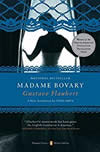 2. Madame Bovary by Gustave Flaubert (April 2010) [Book #88/305]
2. Madame Bovary by Gustave Flaubert (April 2010) [Book #88/305]
Also on the Norwegian, Sybervision, Observer, and My Book lists - The first thing I noticed while reading Madame Bovary was how well is flowed. One idea flowed into another, most of it without a break or pause. Seemingly unconnected thoughts were put together seamlessly in a string of narrative that I could only hope to replicate. I loved reading this book, especially after The Canterbury Tales, since the language was so much easier to follow and I'm not trying to decipher what the author is saying, I'm just enjoying the words. I did have some problems with the book though. The first being the very weak female characters, especially the main character. She seemed mostly to be reacting to events in her life and not being proactive in any of her choices. Nothing she did was really in response to what she wanted and more in response to what someone else wanted. And her child was the most useless of characters, almost inconsequential for 99% of the story. So, even though it did have some weak points, it was a marvelously written story and I would definitely recommend this as a must read.
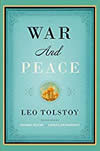 3. War and Peace by Leo Tolstoy (August 2011 - February 2012) [Book #102/305]
3. War and Peace by Leo Tolstoy (August 2011 - February 2012) [Book #102/305]
Also on the Norwegian, Sybervision, and the BBC lists - This is often mentioned as one of those books known just for being long, and long it is (~1600 pages) but not many people can say what the main story is about. This book follows Napoleon's invasion of Russia during the early 1800's, but most importantly during 1812. My overall impression of War and Peace, is that it feels like a typical Russian novel. In this instance the characters are a little easier to figure out than a typical Russian novel, because he doesn't use as many names for the same character as Dostoevsky often does. Even so, he does has a lot of reoccurring characters. As I think about it now, I'm not sure if all of their story lines were wrapped up by the end of the novel. You forget about some of them, then all of the sudden they return. The story is a historical fiction novel with the characters interacting with historical figures. It actually felt like a history novel because the situations played out so well. I would recommend this book to any history buff interested in the Napoleonic Wars, although I still don't understand why Napoleon was driven from Russian, even now. The book is divided into 4 books, with 2 epilogues, and an appendix. The first epilogue felt so much like the rest of the book that I'm not sure why it was made as an epilogue. It just continued the story on from the previous section. It even has chapters. But the second epilogue is what broke me. After reading this book for 7 months you give me this theoretical musing on the purpose of war and why Napoleon did what he did. It was definitely a drudge to get through and I am convinced he wrote that last section just so people would never finish this book. The second epilogue mimicked the style used for the first one or two chapters of each book but this was just orders of magnitude worse. During the actual story, he would give an overall synopsis of the war, and what Napoleon was thinking, then move right back into the story, but the second epilogue had no place in this book and you would miss nothing by skipping it. Overall, I felt the story was good but I never felt anything for the characters. When they died, I didn't really care. And that about sums up my feelings on this book. It is over and I don't really care.
 4. Lolita by Vladimir Nabokov (January - February 2011) [Book #98/305]
4. Lolita by Vladimir Nabokov (January - February 2011) [Book #98/305]
Also on the Observer and the Norwegian lists - This was a rather odd book for me. At first I thought the book would never, ever, make it on to my Must Read List because of the semi-pornographic nature of the book. But it was worse than that, it made me feel awkward because it is all about a man who has a sexual interest in pre-pubescent girls (around the age of 12-14). So all the while I am reading this, I feel like I am going to get in trouble for child pornography. By once you get past the initial portion of the book things got really interesting. The second half of the book I found to be by far the better half. It focused more on the mental anguish of the main character as he pursues his Lolita, both knowing that he has and will destroy her life, but also not being able to control himself. It is a perfect view into self-destructive behavior. The main plot point of the story is similar to another book I had read, An American Tragedy, which focused on a person in jail and you basically found out how he ended up there. But there is a difference in Lolita, where the story is a first person narrative of basically how he ended up in jail. And throughout the story you assume how he ended there but as you progress you realize you were wrong and it really is for something different. The story was rather riveting in this aspect and I did enjoy the second half of the story immensely. So, all in all, I can't recommend this story due to the awkward feeling first half (which I imagine is almost impossible to get through for some people) but I did enjoy it and would recommend it for those who could get past that point.
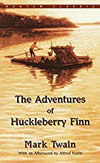 5. Adventures of Huckleberry Finn by Mark Twain (1996ish) [Book #3/305]
5. Adventures of Huckleberry Finn by Mark Twain (1996ish) [Book #3/305]
Also on the Norwegian, Sybervision, and the Observer lists - Huckleberry Finn is one of the many novels on this list which I had read as a result of a high school assignment. I actually had to read it a couple of times for school and I have since come to love the book. It is a rather contentious book because of the language used in the book, specifically the "N" word used so prolifically throughout, however I feel that is one of the reasons it should be read. The book forces people to look at where we were as a country, where we are now, and how far we still have to go. The main plot revolves around a childhood adventure story, where Huck runs away from home getting into all sorts of trouble along the way. He travels on his trip with escaped slave Jim, whom Huck goes from seeing just as a slave to eventually seeing him as a person and a friend. This book is a must read, if only because people try to ban it.
 6. Hamlet by William Shakespeare (1998) [Book #8/305]
6. Hamlet by William Shakespeare (1998) [Book #8/305]
Also on the Norwegian and Sybervision lists - Hamlet is often considered to be Shakespeare's best play, and this is a rating I can get behind. The tale is about a man trying to find the murderer of his father, while dealing with the slowly ensuing madness of most of the characters around him. Unlike Macbeth, I found Hamlet to be intriguing and quotable. Several of the scenes are memorable, even now, many years after having last read/seen the play. If I had to point people to only one Shakespeare's play to read or watch, this would be the one.
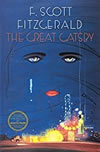 7. The Great Gatsby by F. Scott Fitzgerald (1996?) [Book #4/305]
7. The Great Gatsby by F. Scott Fitzgerald (1996?) [Book #4/305]
Also on the Observer, Sybervision, and BBC lists - Along with a host of other significant stories of the early 1900's, The Great Gatsby finds itself as another mandatory school read. And like many of those books, this is one I need to go back to some day to truly understand the details that I likely missed as a high school student. The book follows the life of a man in the 1920's, who created his fortune (a member of the nouveau riche) while living around people who inherited theirs. These separate worlds clash during the Roaring 20's when people accustomed to "the old ways" must learn to adapt to the new ways that are up and coming. However, Gatsby's excesses may be a bit more than even the most liberal of people could withstand (at the time). A novel about religion, poverty to wealthy, love, and a whole host of other themes interwoven into the fabric of the quintessential 1920's American story.
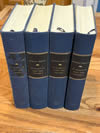 8. In Search of Lost Time (AKA Remembrance of Things Past) by Marcel Proust (June 2023-August 2024) [Book #180/305]
8. In Search of Lost Time (AKA Remembrance of Things Past) by Marcel Proust (June 2023-August 2024) [Book #180/305]
Also on the Observer and Norwegian lists - In Search of Lost Time holds a couple of places in my heart. First and foremost, it is by far the longest book I have ever read. It is ranked as one of the longest books ever written and clocks in over 4,000 pages depending on the print and page size. However a better estimate is the word count which is 1.175 million words. For comparison War and Peace has only 0.56 million words. So this book is essentially two War and Peace length books. It also took me over a year to read because it is a brain strain. He writes in VERY long sentences. Counting out the words of one notable sentence had me at 203 words for that sentence alone.
The book itself is broken down into seven volumes (these seven were then places into the four physical volumes that I had read and pictured above). The first volume of the story is probably the most famous and is often read as a standalone story, Swann's Way, however it was never meant as its own story. The text is also formatted without many paragraphs, about one per every two pages, and conversations flowed within the paragraphs instead of being seperated out into unique line breaks, as is the standard format. This means it generally took me about an hour to read 20 dense pages and I was often mentally exhausted after that from trying to follow the story. Another note of accomplishment is that this book was the last of the Zane's Top 10 books for me to finish, marking the first list I have successfully completed.
The story itself was ... interesting. It follows the remembrance of Proust's own life through his memories. And while the story generally flows in chronological order, he had a tendency to have tangential thoughts for pages at a time, where he will jump forward in time or ponder some theoretical question he had been grappling with. While I enjoyed the linear part of the story, the theoretical parts got to be a bit old after a while, especially when he would re-harp on the same essential questions over and over again. This story was also surprisingly "modern", with the author extensively tackling the subject of homosexuality. For a novel written in the early 1900's I was not expecting this pervasive look at homosexuality of the time. Here is though, one of the primary problems I had with the central part of the story. This is when the main character, presumably Proust himself, essentially kept his girlfriend "kidnapped" (for lack of a better word) in his house because he had assumed she was sleeping around with other women and he was jealous (maybe?). He would ponder many times over if she liked women, for 100's of pages at a time, with him never satisfactorily answering his own question (however as the reader I felt it was satisfactorily proven a yes). Many of the men also in the book led secretive homosexual lives, with one engaging in full on sadomasochistic acts during the latter parts of the novel. When he first delves into this aspect of the book he seemed to be weighing the morality of it, however eventually it seemed to me that he had accepted that side of society and proceeded right along (except when related to his girlfriend). Like I said, while this was completely unexpected, it was definitely not unappreciated on my part.
While there were parts of the story that were repeated ad nauseum, there were many parts I found fascinating. As time went by, we had the evolution of technology and how it changed. From the first telephones through the widespread use of the automobile, and how they impacted the characters lives. But time in this book was tricky, where it wasn't until the end of the book that I understood that this was all written as his memories. Time fluctuated through the book sporadically, to the point that you never really knew how much time had passed at any given point. Parties he attended took 100's of pages to depict but then years would fly by in the blink of a page. The book was also very "real", where deaths just happened as in real life, with most happening without a satisfactory reason that one would often find in stories. And for a book that seemingly went on forever there were many aspects that never got explained. There was a contemporary court case, often known as the Dreyfus Affair, that was constantly brought up and influenced the characters majorly, but was never actually explained within the story itself. Proust mentioned many times about his infirmity, but barely delved into what exactly he had. And there were other things that Proust felt he didn't need to explain, I assume because he felt a contemporary audience would understand. The book also didn't really have the flow of a "normal" novel. There was no literary action. There was no definitive conclusion. It just sort of winds down at the end, which presumably was when he started writing the book (since this was his memoirs of a sort).
Overall this is a difficult book to sum up and recommend to people. It is a monumental task to undertake and finish. It is also a difficult book to engage with and consistently stay engaged with. However finishing it I feel like I summited a literary mountain that I will proudly wave my flag upon. So while I am proud to have finished it and I found it worthwhile for the most part, I don't think I could recommend it to others to tackle unless they wanted the same goals as I.
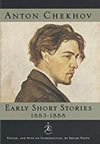
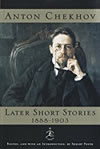
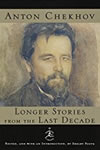 9. The Stories of Anton Chekhov (December 2012 - April 2018 (Long gap in reading)) [Book #146/305]
9. The Stories of Anton Chekhov (December 2012 - April 2018 (Long gap in reading)) [Book #146/305]
Partially included in a book on the Norwegian list - This was a weird one for several reasons. I did a previous reading of some "Selected" short stories for the Norwegian Book List prior, however this Zane's Top 10 Book List only listed the book as "The Stories of Anton Chekhov". When searching on Amazon though, there is no book entitled "The Stories of Anton Chekhov", however there is one listed as "Selected Stories of Anton Chekhov". I had taken the listing on Zane’s Top 10 book list to mean all of Anton Chekhov's short story work. Well that became a chore in and of itself to find. My initial reading of Selected Stories by Anton Chekhov had a lot of his short story works but not anywhere near all of them. That is when I stumbled upon the Modern Library versions pictured above (of course needing to purchase on the hard cover editions for my personal collection). The first two are what I delved into only later to find out there was a third volume. On top of that, this doesn't even include ALL of Chekhov's work. But it does account for 75% of his work (by page count according to the editor, Shelby Foote). The funny thing is that the previous Selected Works book that I read doesn't have many stories that cross over between the two series. So that being said, I've read most of Chekhov’s short story works and I am happy to call it “mission accomplished”.
So what did I think of his works? Well that depends on what he was writing about and when in his career he wrote them. The benefit of the Modern Library layout, is that they are presented in chronological order, so that the reader can get a feeling for his writing as he progressed through his career. His initial style was very weird. It often felt like an Edgar Allen Poe work, just without the twist ending, all the while I'm waiting for the proverbial ax to drop. It never does. The story just ... ends. Well ... ok then. His later stories are where he really starts to shine. Easily his best work is The Bet. I had a friend ask me if I had read a certain story of his, with him citing it as his best. However, I couldn’t recall which one as I was going through them. Well when I finished that story, I knew exactly which story he was referring to. Of all Chekhov’s short stories, The Bet is the one with the most story-like plot. Most of Chekhov’s stories describe everyday Russian life. Which is great and all but often it results in a profoundly dull read. The Bet goes above and beyond that. If Chekhov had continued more in that vein of writing, I think he would be viewed much differently in modern day society.
Overall, I feel his longer stories in the third volume are probably overall his best. With the longer format, Chekhov has the room to breath and really flesh out his characters and his stories. My favorite of these was probably The Wife, but in general most of these were his better works. I think that if one was to read Chekhov they would benefit greatly by picking and choosing a select few. Most of his works feel overly long and suffer from what many Russian works do, the multiple names of characters. Characters will often have three different names that are used interchangeably and never really give a clear indication of who is who. But if a reader limits themselves to only the very best of his works, they could get some good reading out of it. And one last thing: "Chekhov's Gun". Chekhov's Gun is a famous saying by Chekhov that basically if you place a gun on the wall in one scene then make sure it is used later on. So I read and I read trying to find where this comes up. And ... it doesn't. I looked it up and actually this saying comes from a letter that Chekhov had written. It means that everything in the short story should have importance and not be something that is a throw away. And although I believe Chekhov used this methodology, he could have probably used it better in many instances. I felt a lot of his stories contained extraneous material, although he was an astoundingly good scene setter. So overall, not my favorite work on this list, but I’ve read far worse.
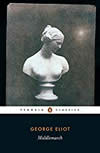 10. Middlemarch by George Eliot (January - March 2008) [Book #71/305]
10. Middlemarch by George Eliot (January - March 2008) [Book #71/305]
Also on the Norwegian, Sybervision, BBC, and My Book lists - I rather enjoyed Middlemarch. It started off slow, but as the book went on it picked up its pace rather well. Although the book was the longest I have yet read on this list, about 900 pages, the plot was simple enough that it was easy to follow throughout the entire book. Middlemarch is a town in England where the book follows the lives of the families living there, mainly two different families and their daughters. The book also delves into a lot of conflicts including doctors versus faith, modern medicine versus traditional medicine, and similar subjects. When I started reading the book I had a brief period where I needed to get used to the language being used but it didn't take me very long and afterwards I could easily understand what was going on. I can easily recommend this book as a great story with good lessons, if you are willing to take the time to read it.
